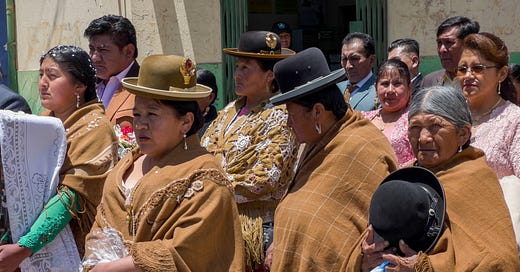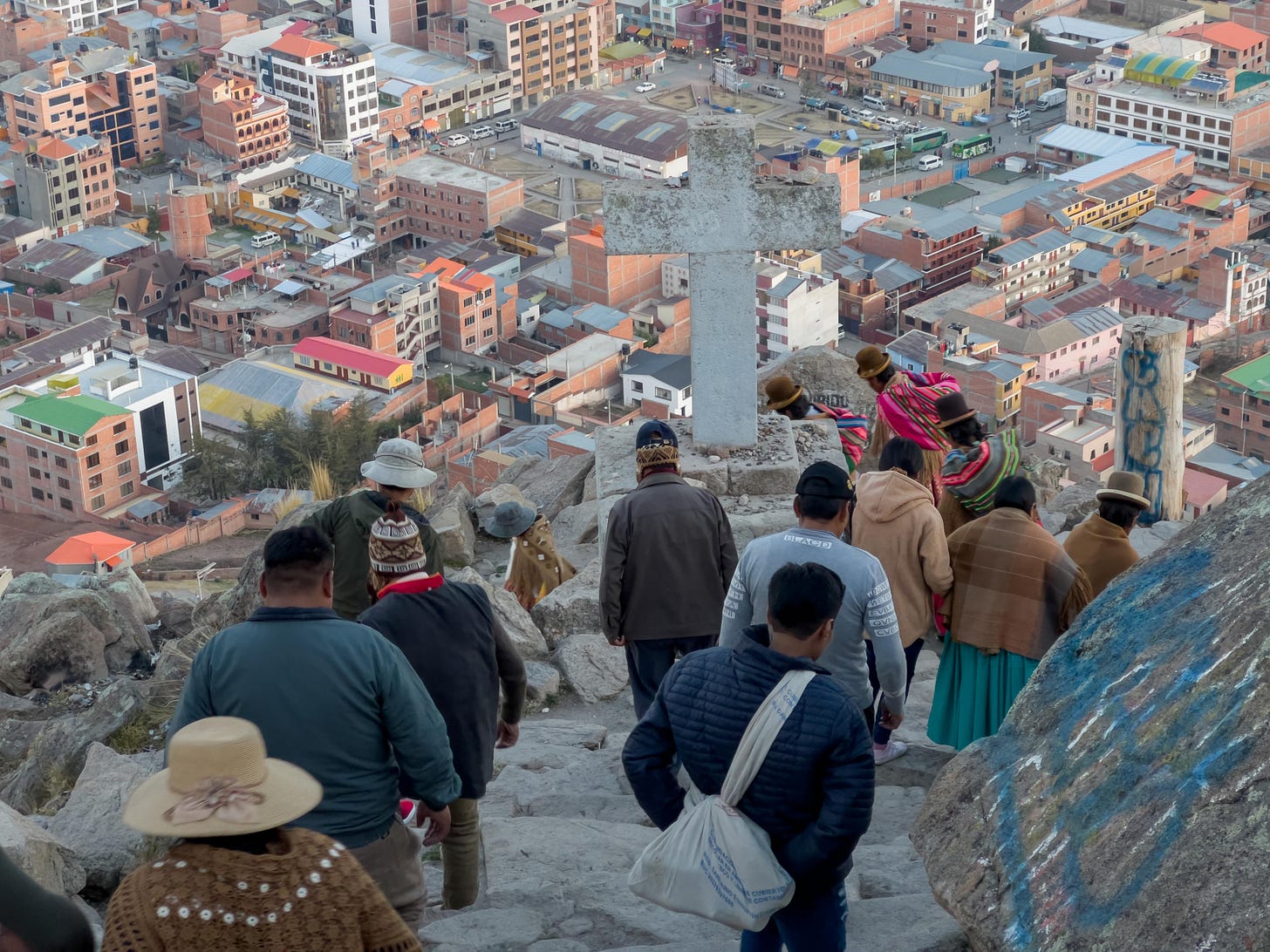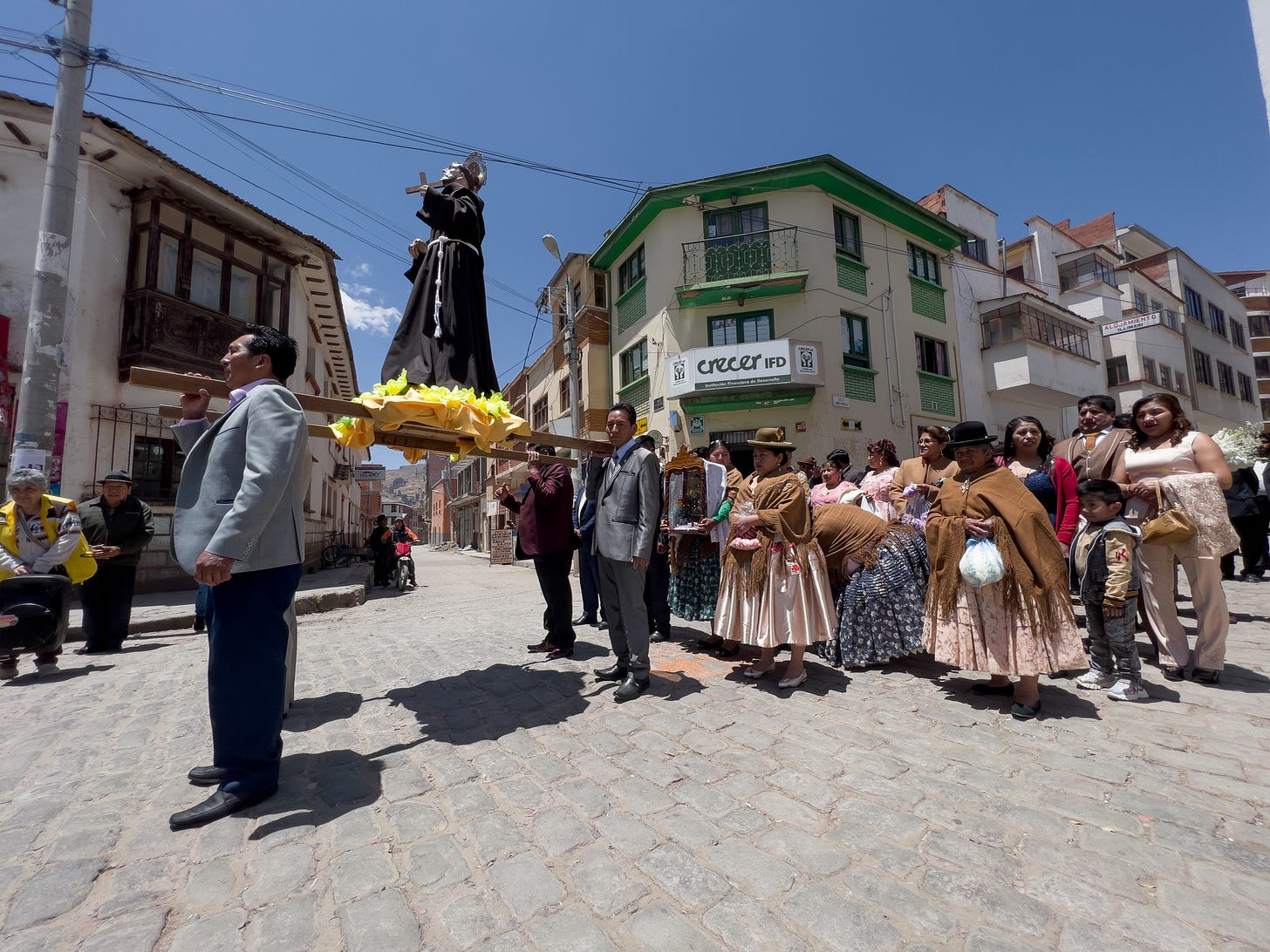Hello to all new subscribers and thanks for joining. I only write when something prompts me, although I can’t think why trust issues have come up this week…
2023 I visit Bolivia and Peru for the first time (some names have been changed)
.
In the church the pews are positioned with large gaps. Pablo nudges me. "It's to let the women in." And in they come, chaperoned by their men who wear shiny three-piece suits, looking like assassins on their day off, which possibly some of them are since the town is reputedly awash with drug money. But it's the women who catch the eye, as is the intention, I suppose. On the head is a tall bowler hat, usually black, but sometimes a softer fawn or a bright scarlet, the sort a Pope might wear, were he an Andean indigenous peasant.
"On its own the hat can cost thousands of dollars," Pablo whispers, "From Italy. Look at the shawls...pure viçuna wool, another few thousand." He shakes his head. "And look at those skirts, so many of them."
It is indeed the skirts, or the hips, that demand attention. The women layer up with several petticoats, then add pleats and padding until their hips are as broad as a Castillian queen. "My wife doesn't do the chola, thank God," says Pablo, "I'd be penniless."
Chola is the Bolivian traditional women's attire. Reputedly the hat came from British railway workers in the 19th century, the skirts from Spanish colonial insistence on decorum. It's like they took all the nagging menfolk's advice and said, ‘OK, happy now?’ As a fashion statement it says, ‘Stand clear. Matriarch coming through.’
A woman navigates the aisle, then manoeuvres herself on to the pew in front of me. Her sicario husband flutters around her muttering, like one of those annoying automated lorry voices. 'This vehicle is reversing.' A dog slopes in unnoticed and tucks itself under the seat.
The priest goes through his sermon. A guitar plays. We stand. We sit. We stand. And then they get Francis of Assisi out his box and carry him down the aisle. The men shadow their women into the square. Everyone squints in the light. The sky is a devastating blue. The church is a cracking white. Firecrackers explode and the chola women chuck confetti at the saint, rather than over him. St Francis's performance is a little wooden. He lumbers along at shoulder height on his palanquin, stopping at each corner of the square to bless the onlookers. An oompah band oompahs.
This is the holiest shrine in South America: the basilica of Our Lady in Copacabana on the shores of Lake Titicaca. In 1578 an image of the Virgin Mary was brought here and started performing miracles. People were healed. Some pilgrims whose ship was sinking prayed to her and were washed up in Brazil on a particular beach which they named after her. In 2013 thieves robbed her of all the gold and silver adornments. They used a ladder from a mobile phone mast near the basilica.
I'm entranced by everything, but it's time to go. Pablo drops me off at the border post for Peru. I'm meeting a driver who will take me to Puno at the north end of the lake.
The immigration post is closed. It's a Sunday. A young man strolls over to me, "Kevin? I'm Felipe, the taxi man."
We wait until opening time and I get my stamp, stroll a hundred metres, another stamp. Then we set off. Felipe is quiet, apparently not wanting to talk.
After a few miles, I spot something down by the lake, "STOP!!"
Flamingos. A great flock of them, stepping ornately through the shallow blue water, their feathers a vivid pink and white. Felipe follows my finger, frowning slightly. "Yes, there are many here."
"Are we in a rush?"
He frowns a bit more. "Not really."
I get out the car. "I'm going to look closer."
Grabbing my camera, I run down a bank and start across a stubbled field. The flamingos are about three hundred metres away. A tiny sinister thought occurs to me: Felipe has everything of mine now. He could just drive off. I don't look back, in case he sees me and thinks I don't trust him. Maybe I don't, but if he thinks I do, maybe he will rise to the occasion. I look back. The car isn't there.
There are two pigs rootling around up ahead so I need to detour around them. I definitely don't trust pigs, having been attacked once by a Vietnamese pot belly at a children's petting zoo. I take another look back. Felipe must have parked up the road.
I'm crouching now, using a bit of scrubby bush as cover. The ground is getting mushy and wet. I have to skirt a few large puddles. Is this a good idea? I push on. Still not close enough. Some of the outlying flamingos seem to be stepping a tad quicker. If there was an ornithological equivalent of a chola, it would be a flamingo. Lots of layers. Lots of colours. Massive bill.
The scrub bush falls away. There's the blue sky and the blue lake separated by a line of darkness. Then the flamingos decide that I am, after all, untrustworthy. A few take off, but mostly they simply stride away.
"Is it good?"
It's Felipe. He has followed me and stands smiling, a few steps behind me. "You like the birds? Me too."
I take a few distant shots of the birds and give up. We walk back to the car and when we get in, I discover that the ice is broken and Felipe can't stop talking.
He is a student in Puno and works for the taxi company at weekends. He doesn't drink coffee, he doesn't drink tea, but he tried champagne when he was in Paraguay and he loves it. Paraguay? His favourite place in the whole world. He'd live there again if he could. It's a paradise.
What about our destination, Puno?
Puno is a crazy place. The airport at Juliaca was attacked by a mob last week and Puno was cut off from the rest of the country for three days.
The problem is politics. Felipe shrugs. "Our president was Castillo, but then he was arrested and locked up. Here in Puno he is very popular so people rebelled. Twenty-two were killed."
We are passing houses that have been painted with political slogans for various candidates and parties. Castillo dominates. "The owners let the activists do it because they get a free coat of paint."
Peruvian politics is an entertaining game of thrones, a constant shuffle between palace and prison for a handful of crowd-pleasers. Pedro Castillo is currently doing the prison shift. Born to an impoverished peasant family, he became a primary school teacher before a political career beckoned. As president he was a left-winger with right-wing social views. He whipped through four governments in six months which, even by Peruvian standards, is a bit pacy. His progress was checked by the Russian invasion of Ukraine which pushed up fertilizer prices, mucking up his plans. An attempt to dissolve Congress and rule by decree was thwarted. Pedro was arrested and put in prison. Peru has several ex-presidents in prison. It feels like they've tried every available type: Alberto Fujimoro, Japanese-Peruvian technocrat (in prison at the time of my visit), Alejandro Toledo, USA-pleasing liberaliser with indigenous roots (in prison), Alain Garcia, handsome middle-class populist (shot himself before he could be taken to prison); Ollanta Humala, sturdy military man (in and out of prison in a long-running corruption case); Pedro Kuczynski, economist whose family fled the Holocaust (in prison); and so on and on. With Castillo imprisoned the country has finally, after two centuries, been driven to gamble on the only remaining type of human being available that has not previously been tried, a woman. So far Dina Boluarte has not impressed the people of Puno. Her 2004 book on human rights was found to be largely plagiarised. Several Latin American governments have refused to recognise her presidency, but she is still in place.
Felipe points to the burned-out toll booths along the road. "They were attacked in the riots. It's still not safe though. Ten people have been murdered in the last week." He turns to me, suddenly impassioned, eyes blazing. "The police cannot be trusted!"
We fall silent for a minute.
"Did something happen to make you not trust the police?"
He doesn't answer for a while, but I can see he's tussling with something: shaking his head, sighing, his fingers gripping tight to the steering wheel, then relaxing. Finally he says, "My grandfather was a policeman."
The story comes out. His father died when Felipe was a baby and he was taken to live with his grandparents. His grandfather was a heroic figure for him: strong, reliable, and righteous. But then one day the Maoist rebels, the Sendero Luminoso, bombed his police station, killing several of his colleagues and leaving him deaf. In the aftermath Felipe's hero slowly disintegrated, taking up heavy drinking which in turn drove his wife, Felipe's grandmother, to seek solace elsewhere. She found it at the local Mormon Church. Felipe was taken along. He became a Mormon.
He glances across at me a little self-conscious. I'm astonished. "Are Mormons common in Peru?"
He nods. "More and more. There are about 200,000."
"But you don't seem like a Mormon."
He grins. "As I grew up, all my family were Mormons. I never questioned anything. It was all accepted. Joseph Smith. The Book of Mormon. Salt Lake City. I was a 110 per cent believer."
When he was nineteen, the church gave him a business suit and a name tag, then sent him to Paraguay to convert the heathens. But what Felipe saw did not seem right. The American missionaries from Utah were pushing American culture, something he didn't like. Slowly he began to question things. He read history books. "For the first time I learned that Peruvian police committed atrocities during the Sendero time. I hoped my grandfather was not one of them, but I had to think he might have been."
Somehow, his loss of faith in his childhood hero was matched by a loss of faith in Mormonism and a Supreme Being. His mission to Paraguay ended with only one conversion, his own. He became an agnostic.
Eventually he flew back to Peru where he had to face the music. His uncles were furious. The family abandoned him, but he did not back down. "I had to do it, to be myself."
It has been a lonely path. "I can say that no one understands. Almost everyone here believes in God."
He lives quietly, alone. One day he plans to go back to Paraguay. "Honestly, Kevin," he says earnestly, "It's like paradise. People say hello in the street, and they smile at you."
All too soon it's time to get out his taxi and say goodbye. We shake hands. I tell him he's a courageous man, a true hero. He grins, but then looks a little anxious and drives away, taking his heartbreakingly simple vision of paradise with him.











On the west coast of South Africa, about an hour north of Cape Town, I met an old fisherman who told me that Flamingo make the best meatballs, or frikadelle, as they're known here.
I didn't try them.
You trust the world, your footsteps on the earth, and it is a gift to be let in to the places you inhabit. Ty